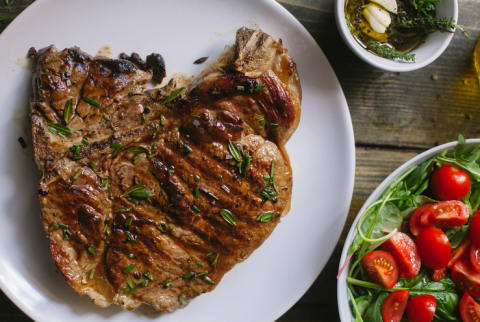Advertisement


I may be a staunch vegan, but when I say some of my best friends are Paleo, I'm not kidding. Dave Asprey of the Bulletproof Diet (admittedly not exactly Paleo) is a friend, and I've been interviewed on his podcast. Dr. KellyAnn Petrucci, the Queen of Bone Broth, is a great ally. Even one of my children has benefited from a diet best described as Paleolithic, and I've contributed positive thoughts on some aspects of the Paleo diet.
Advising dietary patterns to the public requires intellectual and academic honesty, as the topic is complex and prone to emotion. As I regularly read and listen to materials labeled Paleo, I repeatedly encounter statements presented as fact but are in error. Some of these Paleo diet myths are discussed here.
1. “Eskimos eat a high-fat diet and have little heart disease.”
Eskimos are given as an example to prove the wisdom of high-fat, animal based diets. Research by Bang and Dyerberg in the 1970s characterized the Eskimo diet, but did not investigate the frequency of heart disease. A recent analysis in a respected medical journal reported that the heart disease was as frequent in Eskimos as Caucasians. Furthermore, lifespan among the Inuit population is about a decade shorter than the rest of Canada.
2. “Masai eat a diet high in animal products and have healthy hearts.”
Much has been written about this group of East African natives who may eat predominantly animal foods for a period of their lives. There are very few peer-reviewed data on the subject of their heart health. In one autopsy study, the status of hearts and arteries of the Masai showed “atherosclerosis which equaled that that of old U.S. men." The increased physical activity of the Masai compared to Western civilizations, not diet, was credited with promoting health. Furthermore, the average life expectancy of the Masai appears to be under 50 years, again raising the issue of whether there lifestyle is relevant for our health goals.
3. “Dr. Ancel Keys hid critical data from the Seven Countries Study.”
I repeatedly read smart people who completely botch the truth on this topic, and I have to conclude they simply haven’t researched it. The Seven Countries Study was begun in 1958 to investigate relations between diet and health in 16 communities in seven countries. The investigators, including Professor Keys of the University of Minnesota, published their first results in 1970.
I've written on this topic before. Dr. Keys did present a paper in 1955, before the Seven Countries Study, offering a hypothesis that dietary fats and heart disease were related. He used a government database (FAO) and chose six out of 22 countries that he judged had reliable data. When critics plugged in the data from all available countries, they confirmed Keys’ observations, even indicating that it was animal fat specifically that related to heart deaths. These correlations prompted the study. It's time for authors to let Dr. Keys, who passed away at age 100 as a revered scientist, to rest in peace.
4. “The data for the Paleo diet and heart health is robust.”
Whole books have been written on the Paleo diet and heart health. When I lecture on heart health, I draw from nutrition studies such as the Adventist Health Study of nearly 100,000 participants, the EPIC-Heart trials with more than 500,000 subjects, and other large collections of observations.
Even the original study by Dr. Dean Ornish on reversing heart disease with low-fat, plant-based diets in 48 patients was expanded to nearly 3,000 subjects, leading to Medicare approval. A search of the National Library of Medicine for vegan diets in humans finds nearly 3,000 studies, while there are fewer than 100 for a similar search of Paleo diets. The scientific proof of concept for Paleo diets being heart healthy is drawn from very small, short-term studies. None examine the impact of higher fat, animal-based diets on coronary artery lesions.
5. “There are no native plant-based cultures.”
This argument is commonly mentioned by Paleo diet proponents. In fact, there are cultures that have been reported to follow completely vegan diets and about 10% of the millions of followers of the Seventh Day Adventist Church report they are completely vegan.
More compelling is the data from the one of the Blue Zones, the Okinawan Islands of Japan, where the greatest concentration of centenarians is found. Their traditional diet consisted of only 3% of calories from animal sources and less than 10% of calories from fat.
To argue that no native culture has been completely plant-based, whether true or not, is about as meaningful as arguing that no native culture has lived with wifi, BHT, and RoundUp. Dietary recommendations must be made in view of current concerns over food purity and competition from inexpensive, nutrient-poor options that compete for the public’s dollars even if these concerns didn’t exist in the past.
Paleo, vegan, Mediterranean, Dash, “Pegan” and other dietary plans share common ground. They're all clean diets that reject hyper-processed, nutrient-poor meals that are the major source of calories in the Western diet.
There are important differences between these diets in terms of environmental damage, animal cruelty and scientific issues regarding the amount of fat, complex carbohydrate and protein for optimal health and longevity. Advising the public on healthy eating plans is such an important task that there's no place for mythology.

Dr. Joel Kahn is the founder of the Kahn Center for Cardiac Longevity. He is a summa cum laude graduate of the University of Michigan School of Medicine and is a professor of medicine at Wayne State University School of Medicine. He is owner of GreenSpace Cafe in Ferndale, Michigan. His books, The Whole Heart Solution, Dead Execs Don't Get Bonuses, and Vegan Sex are all available for sale now.
More from the author:
Functional Nutrition Training
Check out Functional Nutrition Coaching
A cutting-edge nutrition deep dive taught by 20+ top health & wellness experts
Learn moreMore from the author:
Functional Nutrition Training
Check out Functional Nutrition Coaching
A cutting-edge nutrition deep dive taught by 20+ top health & wellness experts
Learn more
Dr. Joel Kahn is the founder of the Kahn Center for Cardiac Longevity. He is a summa cum laude graduate of the University of Michigan School of Medicine and is a professor of medicine at Wayne State University School of Medicine. He is owner of GreenSpace Cafe in Ferndale, Michigan. His books, The Whole Heart Solution, Dead Execs Don't Get Bonuses, and Vegan Sex are all available for sale now.
Watch Next
Enjoy some of our favorite clips from classes
Enjoy some of our favorite clips from classes
What Is Meditation?
Mindfulness/Spirituality | Light Watkins
Box Breathing
Mindfulness/Spirituality | Gwen Dittmar
What Breathwork Can Address
Mindfulness/Spirituality | Gwen Dittmar
The 8 Limbs of Yoga - What is Asana?
Yoga | Caley Alyssa
Two Standing Postures to Open Up Tight Hips
Yoga | Caley Alyssa
How Plants Can Optimize Athletic Performance
Nutrition | Rich Roll
What to Eat Before a Workout
Nutrition | Rich Roll
How Ayurveda Helps Us Navigate Modern Life
Nutrition | Sahara Rose
Messages About Love & Relationships
Love & Relationships | Esther Perel
Love Languages
Love & Relationships | Esther Perel
What Is Meditation?
Box Breathing
What Breathwork Can Address
The 8 Limbs of Yoga - What is Asana?
Two Standing Postures to Open Up Tight Hips
How Plants Can Optimize Athletic Performance
What to Eat Before a Workout
How Ayurveda Helps Us Navigate Modern Life
Messages About Love & Relationships
Love Languages
Advertisement

This Meditation Will Reacquaint You With Your Subtle, Energetic Body
Kristin Leal, E-RYT 500

This Approach To New Year's Resolutions Is Way More Long-Lasting
Tanya Carroll Richardson

This Meditation Will Reacquaint You With Your Subtle, Energetic Body
Kristin Leal, E-RYT 500

This Approach To New Year's Resolutions Is Way More Long-Lasting
Tanya Carroll Richardson

This Meditation Will Reacquaint You With Your Subtle, Energetic Body
Kristin Leal, E-RYT 500

This Approach To New Year's Resolutions Is Way More Long-Lasting
Tanya Carroll Richardson

This Meditation Will Reacquaint You With Your Subtle, Energetic Body
Kristin Leal, E-RYT 500

This Approach To New Year's Resolutions Is Way More Long-Lasting
Tanya Carroll Richardson







